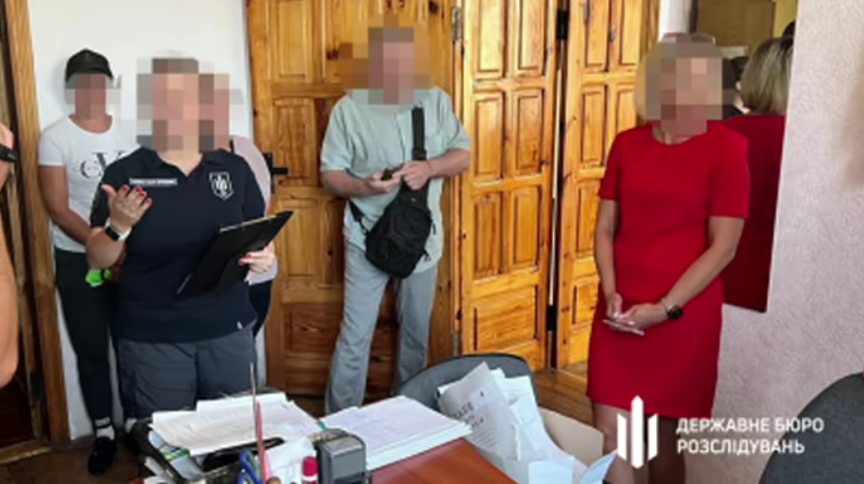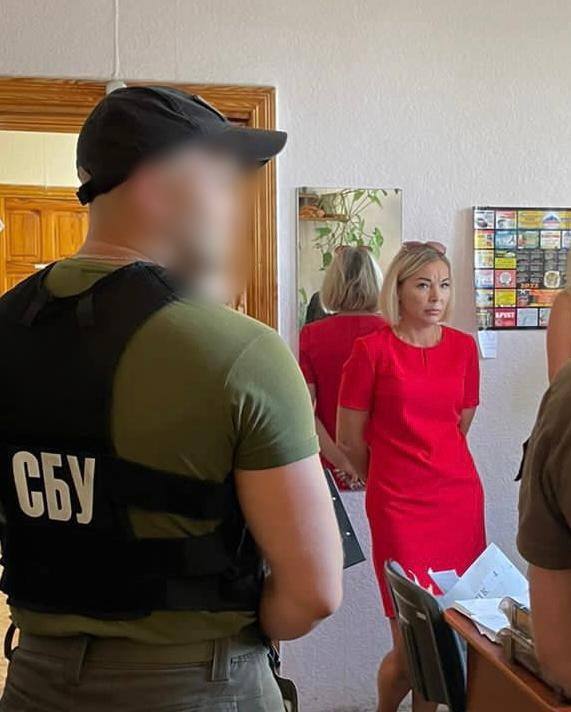On July 6, 2023, 44-year-old Svetlana Fedorets, a judge from the Zvenigorodka District Court in the Cherkasy region, was arrested. Fedorets, originally from Melitopol in the Zaporizhzhia region (currently under Russian control), lived and worked at the Akimov District Court (also under Russian control), but was transferred to Cherkasy in June 2022 and appointed chair of the local court. Her Melitopol origins are part of the prosecution’s case against her.
According to the SBU press service, the judge “justified the Russian aggression” and referred to the January 2023 attack on an apartment building in Dnipropetrovsk as “collateral damage.” They reported that she allegedly resigned before being formally charged, intending to return to Melitopol, where her ex-husband lives, and then move to Crimea, where her children, mother, and brother live as refugees. In short, the woman simply wanted to reunite with her family. So why was she charged under Part 3, Article 436-2 of the Criminal Code (justification of Russian aggression), which carries an eight-year prison sentence with confiscation of property?
The indictment makes no mention of “collateral damage.” Fedorets’s alleged crime consisted of a private phone conversation with a friend, judge Darya Sakun, which was intercepted by SBU officers.
On May 16, 2023, the defendant ironically told her friend: “Everyone in Crimea is waiting for us; there’s devastation, disaster; we’ll be clearing up the consequences of the Russians’ presence there for another 10 years,” adding, contradicting herself: “Never mind that these Russians have been diligently clearing up the consequences of Ukraine’s presence there for 10 years?”
The SBU interpreted these two sentences as “justifying the temporary occupation of part of Ukrainian territory – the Autonomous Republic of Crimea – as a supposed necessity for updating the infrastructure of the occupied peninsula, destroyed by the actions of the Ukrainian authorities.” A subjective assessment of Crimea’s infrastructure, expressed in a private conversation, became the basis for prosecution under an article carrying up to eight years imprisonment.

The phrase: “Zelensky’s got everything bad there, and everything is under the gun,” was interpreted as denying the occupation of Crimea by portraying it as a voluntary act of the Ukrainian people. However, it’s clear that this phrase says nothing about voluntary action. The phrase concerns Volodymyr Zelenskyy, and Crimea was annexed by Russia long before Zelenskyy became President of Ukraine.
The phrase: “The only thing that bothers me is that our region wasn’t exchanged for something worthwhile,” said about Fedorets’s native Melitopol (in the context of the Russian army’s withdrawal from Kherson), was interpreted as acknowledging the legitimacy of Melitopol’s occupation “by expressing unwillingness for its liberation from Russian occupation.” The connection between this statement and the legitimacy of the occupation is unclear. Judge Fedorets could have considered the occupation illegitimate while simultaneously questioning certain actions of the Ukrainian authorities in a private conversation. Only Svetlana can definitively explain what she meant by this phrase. But even if she “acknowledged the legitimacy of Melitopol’s occupation” in this form, she did so in a private conversation that could not have become public knowledge, and therefore could not have become an element of propaganda.
Two days later, on May 18, the SBU intercepted another conversation between Judge Fedorets and her friend, in which Svetlana, according to the prosecution, justified Russian missile strikes on Ukrainian civilian infrastructure resulting in mass casualties, saying: “Do you think they have nothing to do, hitting residential areas? Well, they didn’t aim for the building in Dnipro. Uman? Sorry, there was a base with NATO equipment there.”
Firstly, this seems to be the same statement about the apartment building in Dnipropetrovsk that the SBU press service presented as words about “collateral damage.” As you can see, nothing of the sort is present here. Secondly, Fedorets only expressed doubts that the Russians intentionally target residential areas. This is unlikely to fall under Article 436-2 of the Criminal Code on “justification of Russian aggression,” as this statement contains nothing about the reasons and motives for starting the war.
Later that day, the judge allegedly “denied the Russian aggression by portraying it as the mass murder of Ukrainian civilians by Ukrainian Armed Forces soldiers, and their violation of the laws and customs of war.” The wording itself is incorrect. It’s about the fact that, reacting to her interlocutor’s words about the impossibility of targeted fire by Ukrainian Armed Forces soldiers against Ukrainian citizens, and also talking about the reasons for the departure of residents of Mariupol to Russia, Fedorets said: “Because they saw who was shooting at them. They all hated Ukraine. You may not believe it. Snipers were shooting. They didn’t let people out of the city because they needed a human shield. They evicted people from their apartments, not allowing them to even take baby food.” Her friend said she didn’t believe it, and Fedorets added: “They threw grenades into the basements because people were speaking Russian there.” These words, whether true or fiction, have nothing to do with “denying Russian aggression” and concerned exclusively the actions of the Armed Forces of Ukraine and the reaction of Mariupol residents.
The next phrase in the indictment is even more baffling. Continuing the conversation, Fedorets allegedly acknowledged the legality of Russia’s seizure of Melitopol and Crimea by asking her interlocutor: “Now tell me, why did people go to Melitopol and Crimea if there was an opportunity to go to Zaporizhzhia? Why did they go to Russia?”
One can acknowledge something through assertion, not a question. Moreover, it says “to Melitopol and Crimea.” This is the direction people took to reach Russia. That is, Melitopol and Crimea are not named as Russia, and even if they were, what is the justification for the occupation? Fedorets states a fact – many fled the war towards Russia. According to the UN, there are about 1.5 million refugees from Ukraine in the Russian Federation today.

The last conversation recorded by the SBU took place on March 30. In it, Svetlana, according to the investigation, acknowledged the legality of the introduction of Russian legislation in the “temporarily occupied territories of Ukraine,” calling it “ours.” The phrase was: “Our legislation of the Russian Federation clearly includes a clause that there will be no mobilization in the new territories for the next three years, from the moment of the referendum.”
How the story about Russian legislation and the ban on mobilization relates to the justification of the occupation is unclear. The phrase “ours” is an interjection, a meaningless word. Whose “ours,” if Fedorets is not a citizen of the Russian Federation? But even if we assume that she considered Russian legislation “hers,” the connection with the legitimacy of its introduction and the article of the Criminal Code on “justification of Russian aggression” is still unclear.
In the same conversation, Svetlana, according to the SBU (Security Service of Ukraine), denied Russian aggression, portraying it as a result of the Ukrainian authorities’ unwillingness to grant the Donetsk and Luhansk People’s Republics (DNR and LNR) autonomous status, as well as the Ukrainian authorities’ provocation of armed conflict through “alleged shelling of certain territories of the Donetsk and Luhansk regions, attempts at their de-occupation”:
“They tried to destabilize Belarus, Lukashenko wouldn’t let them. They tried to destabilize Georgia, they failed, Moldova too, Sandu didn’t give them up. They gave up Ukraine. Excuse me, but the stories about not being able to give autonomy to Donbas… How long has Transnistria existed? Similarly, the unrecognized republic of Abkhazia, how long? Palestine, how long? And nothing, they live, they weren’t recognized and so what? Nobody shoots at them, because it’s not necessary.”
In 2023, Fedorets claimed ignorance regarding Palestine’s future, but otherwise, she’s right – the document providing Donbas with autonomy was called the Minsk Agreements and was signed by Ukrainian President Petro Poroshenko. The agreements granting autonomy to Donbas were recognized by the UN Security Council, and their observance was guaranteed by several EU countries.
Nevertheless, on July 6, 2023, Svetlana Fedorets was sent to a Kyiv pre-trial detention center with the right to be released on bail of 2 million hryvnias. However, all the money the SBU found in her home (several thousand dollars) was seized, and Fedorets lacked the funds to pay bail, and all her relatives are in Russia and unable to help.
At the end of September 2023, at the request of the defendant (to ensure the safety of the participants in the proceedings and to prevent the disclosure of confidential information about the defendant, who is a judge, and her family members), the proceedings were transferred to a closed session. Since she was in the Kyiv pre-trial detention center and the court was in Cherkasy, hearings were held via video conference, but in reality, they didn’t proceed due to constant technical failures. This continued for six months until January 9, 2024, when Fedorets demanded that the examination of evidence begin, which was technically impossible without her presence in the courtroom. Only then was she transferred to a pre-trial detention center in Cherkasy.
The defense’s repeated motions to change the pre-trial measure from detention to house arrest were repeatedly ignored by the court, and Fedorets requested the recusal of the panel of judges. According to her, they did not provide her with copies of the court hearing records in a timely manner, did not serve her with copies of the prosecutor’s motions when considering the extension of the pre-trial measure (which she could not review and therefore could not prepare her counterarguments), and most importantly, the court constantly noted her birthplace in Melitopol and her registration address in territories occupied by Russia, which may indicate prejudice and discrimination. It is unclear how the defendant’s birthplace could be related to the possibility of evading the court. On the contrary, the fact that Melitopol is under Russian control and it is very difficult or even impossible to get there should have been an argument in the defendant’s favor, not against her. Regarding the court’s systematic refusal to reconsider the bail amount, the defense noted that the court did not even consider the return of Fedorets’ belongings seized during the search, particularly the money that she could have used to pay bail.
In mid-February 2024, the motion for recusal was considered and rejected, and on March 6, a hearing was held in the appeals court, which also yielded nothing. Only in December 2024 did Fedorets manage to significantly reduce the bail amount and was released from pre-trial detention. On March 4, 2025, the High Council of Justice of Ukraine dismissed Svetlana Fedorets from her position as a judge of the Zvenyhorod District Court of the Cherkasy region. The criminal prosecution continues.
This translation was made using a neural network. If you find any inaccuracies, please contact us.


